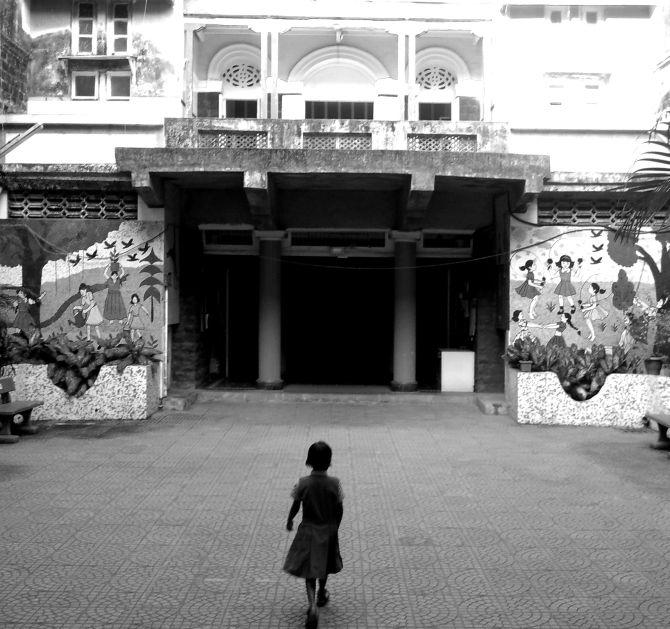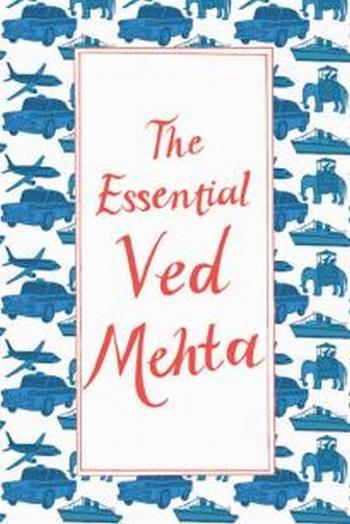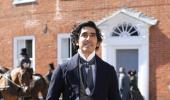On a visit to India in 2013, writer Ved Mehta -- who passed into the ages on Sunday January 10, 2021 -- gave Rediff.com's Vaihayasi Pande Daniel a rare glimpse into his state of mind and what he thinks of the changes he encounters in his motherland.

This feature was first published on Rediff.com on February 26, 2014.
Mumbai's haphazard traffic scrambles across the four-lane flyover above you.
The high arc of the overpass seems to act like a protective roof over this central Mumbai neighborhood, carefully defending it against both noise and time.
Underneath, not all that much has changed, in 75 years, along its drowsy lanes, although the Hindmata Talkies looks disappointingly different from the gracious cinema it once was. The melodic sounds of tongas and trams, which once swam in the air, are also missing.
When you walk into the shabby gates of 160, Dadasaheb Phalke Road, just a quiet road away from the theatre, you wonder if time decisively elected to go sluggish in this school compound.
It is one of those brisk Mumbai winter mornings that a glass of cutting chai would improve no end.
Parents and guardians shuffle into the morose building to drop off their blind charges for class. The little girls are neatly combed and powdered, and dressed in way-too-long regulation green uniforms.
One of the teachers at the Smt Kamla Mehta Dadar School for the Blind tells you that the three-storey structure, with its central courtyard, is about 100 years old. The institution -- which now caters to nearly 200 blind girls -- is still older: 114 years. It was set up by American missionaries to help children blinded by the terrible 1889 Solapur famine, probably from deprivation of vitamin A.
Standing, gazing at the school, my mind goes to the little boy who got his start on life here, 75 years ago.
It is not hard to imagine Ved Mehta arriving at this address, in 1938, to study, as a frail, fearful four year old, with only a cousin for company, weary after an endless rail journey from his home in Lahore, 1,300 miles away. Though secluded, and perhaps sheltering, the place, even today, does not look particularly warm or welcoming.
As you look at the decrepit building you cannot but admire the long journey Mehta made to success. A little boy, who had only recently become blind, which must have been so very traumatic, then leaves the solace of his family, the warmth of the protective pallu of his mother's sari, to get an education here and yet had the gumption and optimism to go to Oxford, Harvard and go on to become an acclaimed writer.
I ask the teachers and caretakers where Ved Mehta lived in the bare school. I draw a blank.
Mehta?
Shrugs. No curiosity.
Unsurprisingly, they have not heard of the blind writer, whose 27 odd books, numerous The New Yorker magazine articles as a staff writer, presented India -- A Letter from New Delhi -- in all its enigmatic hues, in elegant prose, to American and world audiences, decades before globalisation brought the world closer and it is no longer unusual to read an article every day on India, in The New York Times.
And many years before Anita Desai and Jhumpa Lahiri became cozy book club favorites with American housewives.
No, they do not know of this man, who spent a few of his formative years in this dreary building.
Unknown to these mildly bored government teachers, who now run the institution, Mehta made the school famous, when he featured descriptions of his difficult years here and its teachers and students in his books and interviews.
In Face to Face, he wrote: 'My father imagined it was a public school like Eton, but it turned out to be an orphanage. I was thrown together with adolescent boys and girls picked up by the police from the street and brought there for rudimentary education... We finally reached the gate of what Cousin Prakash described as a narrow three-story (ramshackle) building sandwiched between a cotton mill and a congested shop district.'
'Now I was at school... As a child I had no way of letting my father know how different the school was from what he imagined, so I lived there for nearly four years...'
'That experience is never far away from my conscience. When I was there in kindergarten I was the only child of five. My classmates were 18-19 years old, picked up from Bombay streets for begging. And I often think to myself, "There go I but for the grace of God",' he told columnist Sandip Roy.
'India can't stand still while the world is moving ahead'

While change may not have been daring enough to enter the compound of the Smt Kamla Mehta Dadar School for the Blind, Ved Mehta, 79, who is visiting Mumbai and India after a gap of four years (a long time, he says), quietly contemplates what he feels has changed in his definition of India. And what has not.
The meeting is taking place, over morning coffee and cookies, at the Taj Mahal Hotel's Sea Lounge, facing the Gateway of India, a venue where little has altered too, in all these years, except the outrageous prices.
Beyond the window the queenly basalt monument preens in the sun against the Arabian Sea, where boats bob and stodgy ships are anchored.
Mehta, wearing an olive jacket over a black T-shirt, is not upbeat this morning, it appears. Silver-haired, with a severe, craggy Mount Rushmore kind of face, he does not talk much; no idle chatter. A few succinct sentences.
Lively is certainly not a word you would use to describe him. Curmudgeon, on the other hand, would not be fair either.
His warm American wife Linn fusses about pleasantly, smoothing things over. Cajoling him to sign a book -- "Ved, why don't you put your initials?"
He, obstinately: "No." Silence.
And making sure he has his coffee, which seems crucial to the unfolding of this interview.
It nevertheless hobbles along. Monosyllabic yes-no, mainly no, answers. Politely-rejected questions.
"I don't know what you are asking... I don't understand your question. I am sorry... I don't think I meant that? But that will do... You are asking questions as if I were a pundit and I could give you answers. I can't do that... You started out by saying you were going to ask me some very big questions. These are very big questions. There is no answer to them? Idealism? As in i-d-e-a??
"Yes, i-d-e-a-l-i-s-m."
He seems to deflect personal questions. The writer, who bared details of his life experience -- love, adolescence, being blind -- in his books is quite different in person. Reticent. Reluctant. Wry.
"I am sorry I am not doing very well with your interview."
The conversation falteringly moves into a sort of a weak sunlight. There is an occasional quiet smile or laugh. But he does more listening than talking, as you coax replies out of him, often arriving at answers that obstinately refuse to match the questions.
Mehta has a smooth plummy voice. Slightly tired. Sentences often peter off into oblivion.
A perfect British accent (from India and his years at Balliol College, Oxford).
What does he not like about India? Or never liked about India? That has not changed. He ponders for a moment and says softly, "Poverty."
"I mean I walk out and just outside my hotel I have never seen such poverty in my life. Maybe statistically, there are less poor people, than there was before, but if someone gave me such a statistic I wouldn't believe it. Not evident," he ends emphatically.
In 1978 Mehta published The New India. That title, he later wrote, was one of the worst slip-ups of his 60-year writing career because he felt it was closer to Orwellian Newspeak, since then just ousted prime minister Indira Gandhi 'glossed' over the fact that India was still a 'medieval' country, where most people barely earned $2 a day.
What does Mehta think of the indeed newer, maybe less medieval, India we have today?
"There are a lot of changes in India and the world at large. India can't stand still while the world is moving ahead. The fundamental (ones) -- the agricultural policy, the economic policy... there is much more individualism here than there was before. The country has a lot of energy that it didn't have in the 1970s, I think. Of course, I like that. I am all for that. Why not?"
Mehta recall his memories of earlier Indias. For him the manner in which the country's communication has changed is startling. He comes back to that again and again.
He recalls how an information and communication minister (the Congress's Prakash Chandra Sethi) of the former unchanged Hindustan, frustrated with not getting through on a long distance call, took a gun down to the operator to get him to obey his orders.
"Those times are gone. I hope they are gone… Now I can call New York in three minutes flat. That's enormous change. But we don't know what that change means yet. Such changes in communication, what will it do to the country's life as whole. We don't know that. (The earlier lack of communication) made India less current with other countries."
Mehta spent his initial years in Lahore in undivided Punjab. His father Amolak Ram Mehta, a doctor on a transferable job with the government health service, went on to become a senior civil servant in post Independent India.
After his stint at the Dadar school, Mehta was sent to a special school for the blind in Arkansas, and later to Pomona College in California, before he went to Oxford and then to Harvard.
Mehta's father told The New York Times that he did not want his son to suffer the usual fate of the blind in India -- begging or stringing cane seats for chairs for a living -- 'I dreamed I must get Ved out of India. The blind are misfits there. My dreams came true. You must struggle, but dreams do come true.'
Dr Mehta was determined to give his son the best education possible, in spite of being blind, and Ved Mehta made the very best of it. His father's resolve, that he should find success, helped drive his talent.
To write Walking the Indian Streets (1960) and Portrait of India (1970), he spent months on India's streets. He said he covered 30,000 miles by yak, airplane, train, boat, rickshaw, pony, mule, elephant, because he wanted to be sure he had exhaustive information and a real feel of India. He considered them books written as homage to his motherland.
Mehta is a keen observer -- maybe even a cheerer, although it is difficult to imagine -- of the changes that had come over India recently.
"There has been a very big economic change in this country, as you know from the socialist State of Nehru and the previous generation to a kind of individualistic enterprise ethos. That is a very big change. We don't know where that change is going to take us yet. At least I don't."
He seems to reveal his continuing equation with India with that crucial "us."
Mehta has always been of the view that unless you live in India you will not understand what a powerful force politics is in the country. It is a force that animates Mehta too, slightly. He watches the present political scenario with curiosity.
Narendra Modi, the Bharatiya Janata Party's prime ministerial candidate, he said later, after this interview, in Jaipur, was a great danger to India because of his inability to not differentiate between Hindus and Muslims. He acknowledged that it was not a "popular thing" to say, but that he had to because he was "born in a secular race and I will die in a secular race."
The arrival of the Aam Aadmi Party and its leader Arvind Kejriwal on the political scene is of immense interest to Mehta.
"I think certainly this emergence of a one man party -- the Aam Aadmi Party -- I think that's very exciting. It is not completely different, and they have not been here long enough to know how they will do in the world of politics. But I think it is a very interesting political movement both from the point of what it might do to the corrupt practices in the country and from the point of view of what an individual can do in the political sphere..."
"(Kejriwal) strikes me as idealistic and a mover and shaker... (The people, like psephologist and political thinker Yogendra Yadav and dancer Mallika Sarabhai, who have joined him are) a tribute to him and his idea."
He would not compare Kejriwal's arrival in the neta arena to any other period in India's political history. Maybe the period after Indira Gandhi's Emergency ended in 1977 and the Janata Party came in?
"The Janata Party was a very loose alliance of a lot of elderly politicians. I didn't think they would go anywhere. But their influence has been considerable in the country, at large. For instance, when I was talking to (then prime minister) Morarji Desai, he said to me: 'You know people tell me to ban your book. But I can't be a member of the Janata Party and go in for banning your book.' That kind of thing."
Kejriwal is untried and belongs to a party with no political experience. Could that not lead to chaos?
"I don't know. Gandhi was new to this country too, I think. Now, look countries are a very big element. If there is chaos, there will be a way of controlling the various things that created the chaos. I know this sound very laissez-faire, but I really think that journalists make too many conclusions from very little evidence. I think it is very difficult to react to political situations, from moment to moment, because you are always surprised by what's around the corner. That is everywhere, but certainly in India it is more true, because there are such radical changes."
Does idealism figure strongly in his view of the world? He chooses to answer differently.
"Marx came with one fundamental truth that every technological change brings about some kind of cultural change. There have been quite a lot technological changes in India since I wrote Portrait of India. So there have been changes. But the custom of marriage and engagement, fundamental things, in people's lives, continue the way they always did, I think."
What about him personally -- has there been a change in the way he looks at idealism as a force in his life -- or patriotism or ambition or even literature in exile? Have they become more relevant or less so and have they changed?
"Language is always changing. The words are always changing. Meanings are always changing. I still hold to the view that fundamentally there has been no change. You may disagree with me, but that's what I feel. For me, personally, I am always growing and changing, reading all the time. Everything I read makes me think again about (things)... Re-assess..."
"Idealism for me? What does that mean? I don't even understand the question..."
"No, I (still) think idealism is an animating force. If people like Mahatma Gandhi were not idealistic and wanted to change the system of registration of Indians... That is the kind of change that brings big social change. I mean all this e-mail business those are all fantastic changes in a culture. That no doubt means the country is changing. Would you say e-mail has made any difference to idealism in the world? I am not sure."
Penguin India recently released an anthology of Ved Mehta's work, The Essential Ved Mehta ("I think it is a respectable book. There is no reason I should apologise for any of their selections. Good vivid passages they chose, I don't dislike it.")
Mehta is in India, with his wife and elegant daughter Sage, who writes too, on a book tour of sorts.
'Indians never read very much'

After a short stay in Mumbai, he is headed to the tamasha in Jaipur, Mehta's dry, cutting assessment of the Jaipur Literary Festival.
"I think a literary festival is nonsense," he says animatedly. "You can't have a literary festival with more than 10 people. Literature, by its very nature, demands a much smaller constituency. Aap Hindi samajhte hai? Toh phir yeh tamasha hai (smiles). They have tamashas everywhere else. They have circuses in England and America."
So there need not be festivals around books?
"Books are not sacred. There are many bad books written... that's human nature..."
Mehta's blindness is visible. The cerebro-spinal meningitis that robbed him of his sight when he was just four also disfigured his eyes. They often seep tears. In one of his books he writes how the delay in getting him to a larger hospital in nearby Lahore, because of his father's ignorance, and his desire to not miss his usual evening game of tennis, resulted in the loss of his sight.
But the scourge did not take away his vision. It inhabits his books, both in a larger sense, and in the small details. Mehta's writing has always been famous for its ability to amaze readers -- for its extensive visual details -- because it never lets on that the author is blind.
As he has written, 'As far as I am aware no blind writer has tried to recreate the visual world as I have.'
Mehta does not carry a cane or any other aid and his movements are not of a blind man.
Perhaps a non-seeing person's experience of India can be more perceptive than that of a seeing person? Because by simply hearing India he might be catching inflections a seeing person might miss.
He thinks for a few minutes and disagrees, "I am not aware of that. No, I don't think so."
But vision or rather perception/perspective, he agrees, has little to do with sight.
"Think of Beethoven. He was almost totally deaf when he wrote the last quartets (Late String Quartets). No, genius is genius. Beethoven could write that music even though he couldn't hear it. Milton, too, although he had lost his vision earlier, he could deal with his memories. I think there are a lot of cliches about handicapped people that don't ring true. That deaf people are dumber than the rest of world. Even people who hear can be dumber about certain things."
So if one has sight, one doesn't necessarily have vision?
"Vision in the sense of the metaphor? I think that is certainly true."
Literary festivals are steadily becoming popular, across India, as places to be seen, as one city after another succumbs to hosting a festival, two Kolkata festivals, and now a Hyderabad one; it may not be much longer before the country's B-towns join the circuit and there will be Kakinada and Meerut book melas or carnivals. Books sales seem up and Indian publishing is vibrant. Is that indicative that Indians are reading more?
Mehta sharply disputes that belief.
"Indians never read very much. It is not like the Jewish culture in America. There books are very valued and people, who are readers, are valued. I don't know that they are valued here in the same way. Indians were never great readers. I know, Bengalis are an exception and maybe those in Kerala also, but most Indian homes you go to, of middle class or lower middle class, you don't see any bookcases there. Nobody is reading interesting writers. It is mostly trash. It is not a reading culture as a whole."
"But that can change," he offers in consolation.
'I continued to veer between my two selves'

The Essential Ved Mehta, Penguin India's new collection.
Mehta has ruthless views on the new Indian literature, which he has expressed, recently, in his interviews to other Indian publications.
He said he had not read Jhumpa Lahiri because the amount of publicity she gets scared him off.
Arundhati Roy's work needed to be read with a dictionary to understand it, he declared.
A lot of the non-fiction work emerging was unreadable was another unflattering comment.
Only Vikram Seth, he felt, had talent, but even his works did not measure up to the likes of say Virginia Wolf's To the Lighthouse.
But he feels the writing happening around cross cultural themes is certainly growing and there are a multitude of voices.
"I think (Vikram Seth's) Suitable Boy, for instance, could not have been written before this cultural explosion. No, one can never say when a piece of literature might have come around. But certainly that milieu, the post Partition and Independent India did make that possible. And the other books. Anita Desai's books. Ruth Jhabvala's books. They are very tiny rays of hope."
"The fact that they are written and sold in India at all is quite encouraging to me. I mean, it is encouraging that there is such intellectual activity going on in the country. Now, neither Anita nor Ruth were Indians. But there is a mixture there that is worth taking notice of."
In The Essential Ved Mehta, Mehta wrote that, having been born and brought up in the subcontinent, but educated in America and England, he felt neither wholly Western nor wholly Eastern.
A an 'Empire child' he grew up revering all things British.
'When I was young I did not wear a kurta pajama... Instead I wore knickers and a shirt with a collar. In other words, I was a sahib. In such ways, I was at once a colonial even as I was a follower of the revolution of Mahatma Gandhi... I think I developed a dual identity, belonging wholeheartedly to neither the East nor the West -- always precariously balanced between the extremities.'
Does he still feel neither wholly Eastern nor wholly Western (at times his anglicised pronunciation of an Indian word startles you, like the way he mutilates the words Kerala or Bengali)?
"I don't think anything has changed that much. No I don't (think there is some meeting slowly of Western and Eastern cultures and therefore its effect on you). I don't think so. I am sure there are differences all along, but I think fundamentally it hasn't changed. Because I think there is the same kind of veneer of Western culture as there was then. But you know I could be wrong."
Does he continue to look at the West from an Eastern point of view and the East from a Western point of view?
"Look, I know Punjabi very well. I can speak Hindi or Punjabi to you. It is very difficult for people to disguise what they really feel, if you are speaking their mother tongue to them."
One is unsuccessful in prying out the best answer from Mehta, face to face, but the right answer is in The Essential Ved Mehta.
There he conclude, 'It seems that because the nationalism had sunk its roots deep in my consciousness, I continued to veer between my two selves.'










